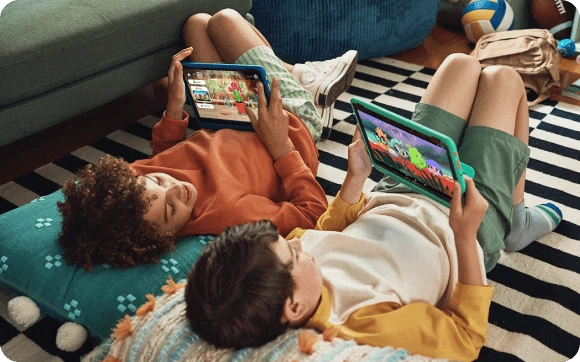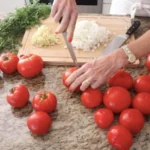“Are you SURE we can’t help it??”
That’s what my 12-year-old asked me last week when I watched him struggle for twenty minutes to untangle a mess he’d made with his fishing line. His face was getting red, his frustration was building, and every parental instinct I had was screaming at me to step in and fix it for him.
But I didn’t.
Instead, I sat there drinking my coffee, occasionally offering encouragement, and resisting the overwhelming urge to take over and solve his problem in thirty seconds flat. Because here’s what I’ve learned about parenting after three kids and more mistakes than I care to count:
Sometimes the most helpful thing you can do is absolutely nothing.
I call it parenting by subtraction, and it goes against every modern parenting instinct we’ve been programmed to have. Instead of adding more help, more intervention, more solutions, you subtract your interference and let your kids figure things out themselves.
It’s harder than it sounds, and it’s more important than most people realize.
We live in a culture of helicopter parents and snowplow parents and every other kind of metaphorical vehicle parent you can imagine. We schedule our kids’ lives down to the minute, solve their problems before they even know they have them, and smooth every possible obstacle out of their paths.
And then we wonder why they graduate from high school without basic life skills or the confidence to solve their own problems.
The fishing line incident was just the latest in a long series of moments where I’ve had to actively choose not to help. Like when my daughter spent an hour trying to figure out why her bicycle chain kept falling off instead of just asking me to fix it. Or when my youngest struggled to reach something on a high shelf and had to get creative with stepping stools instead of just calling for help.
Every time, my instinct was to jump in and solve the problem immediately.
But here’s what I’ve noticed: The problems my kids solve themselves stick with them in ways that the problems I solve for them never do.
When I fix the fishing line, they learn that tangled lines get fixed by calling Mom. When they fix it themselves, they learn how fishing lines work, why they tangle, and how to prevent it from happening again.
More importantly, they learn that they’re capable of solving problems.
This confidence compounds over time. Kids who regularly solve their own age-appropriate problems develop a deep-seated belief that they can figure things out. Kids who have everything solved for them develop a deep-seated belief that they need someone else to figure things out for them.
Guess which group is better prepared for adult life?

Now, I’m not talking about abandoning your kids or refusing to help with things that are genuinely beyond their capabilities. I’m talking about being strategic about when you step in and when you step back.
I’m talking about subtracting your help in situations where struggle would be more valuable than success.
This requires a complete mindset shift from how most of us were raised and how most parents operate today. Instead of asking “How can I help my child succeed?” you start asking “How can I help my child become capable of succeeding on their own?”
Instead of preventing problems, you start seeing problems as opportunities for growth.
It’s not easy. Watching your kid struggle with something you could easily fix triggers every protective instinct you have. You want to spare them frustration, save them time, and ensure they succeed at whatever they’re attempting.
But success they didn’t earn doesn’t build character the way hard-won success does.
I’ve learned to bite my tongue during homework sessions when my kids are working through problems that are challenging but within their capabilities. I’ve learned to walk away when they’re dealing with social conflicts that they need to navigate themselves. I’ve learned to offer encouragement without offering solutions.
And I’ve learned that “I don’t know, what do you think?” is one of the most powerful phrases in parenting.
This approach has produced some remarkable results in our house. My kids are genuinely resourceful. When something breaks, their first instinct isn’t to ask someone to fix it—it’s to figure out how to fix it themselves. When they encounter problems, they brainstorm solutions before they ask for help.
They’ve developed what psychologists call an “internal locus of control”—the belief that their actions and decisions significantly impact their outcomes.
But parenting by subtraction doesn’t just apply to problem-solving. It also applies to entertainment, scheduling, and decision-making.
Instead of constantly planning activities for my kids, I’ve subtracted myself from their entertainment management. They’ve learned to create their own fun, to deal with boredom creatively, and to find satisfaction in activities that don’t require adult organization.
The result? Kids who can actually entertain themselves and who find genuine joy in simple pleasures.
Instead of scheduling every minute of their lives, I’ve subtracted myself from their time management. They’ve learned to balance responsibilities with leisure, to plan ahead for deadlines, and to deal with the consequences of poor time management.
The result? Kids who understand that time is a finite resource and that their choices have consequences.
Instead of making every decision for them, I’ve subtracted myself from their choice-making process wherever possible. They choose their own clothes (even when the combinations make my eyes hurt), plan their own social activities, and make age-appropriate decisions about how to spend their time and money.
The result? Kids who are developing judgment and learning to live with the consequences of their choices.

Now, this doesn’t mean I’ve completely checked out of parenting. I still set boundaries, enforce rules, and provide guidance when they ask for it. I still help with things that are genuinely beyond their developmental capabilities.
But I’ve learned to distinguish between help they need and help they want.
The hardest part of parenting by subtraction is dealing with other people’s judgment. When you let your kid struggle with something that another parent would immediately fix, you get looks. When your child experiences natural consequences that another parent would prevent, people question your parenting.
Our culture has confused helping with loving, and not helping with not caring.
But I’ve seen the results of both approaches, and I know which one produces more capable, confident, resilient kids. I’ve seen children who’ve been helped with everything struggle to function independently as teenagers and adults. I’ve seen kids who learned to solve their own problems thrive in college and beyond.
The temporary discomfort of letting them struggle is nothing compared to the long-term benefit of raising capable humans.
The fishing line finally got untangled, by the way. It took my son way longer than it would have taken me, and he got frustrated multiple times, but he figured it out. And when he cast his line successfully afterward, the satisfaction on his face was worth every minute of my restraint.
That satisfaction—the deep pride that comes from overcoming a challenge through your own effort—can’t be given to a child. It can only be earned.
So here’s my challenge to parents everywhere: Start subtracting yourself from situations where your help would rob your children of the opportunity to grow.
Let them struggle with age-appropriate challenges. Let them experience the natural consequences of their choices. Let them solve problems, make decisions, and figure things out for themselves.
Trust that they’re more capable than you think they are, and give them opportunities to prove it to themselves.
Because the goal of parenting isn’t to raise children who need you forever. The goal is to raise adults who are capable of thriving independently.
Sometimes the greatest gift you can give your children is the confidence that comes from knowing they can handle whatever life throws at them.
Parenting by getting out of the way,
-Nichole
P.S. This doesn’t mean you should never help your kids or that you should let them struggle with everything. It means being intentional about when you step in and when you step back, and always asking yourself whether your help will make them stronger or weaker in the long run.















